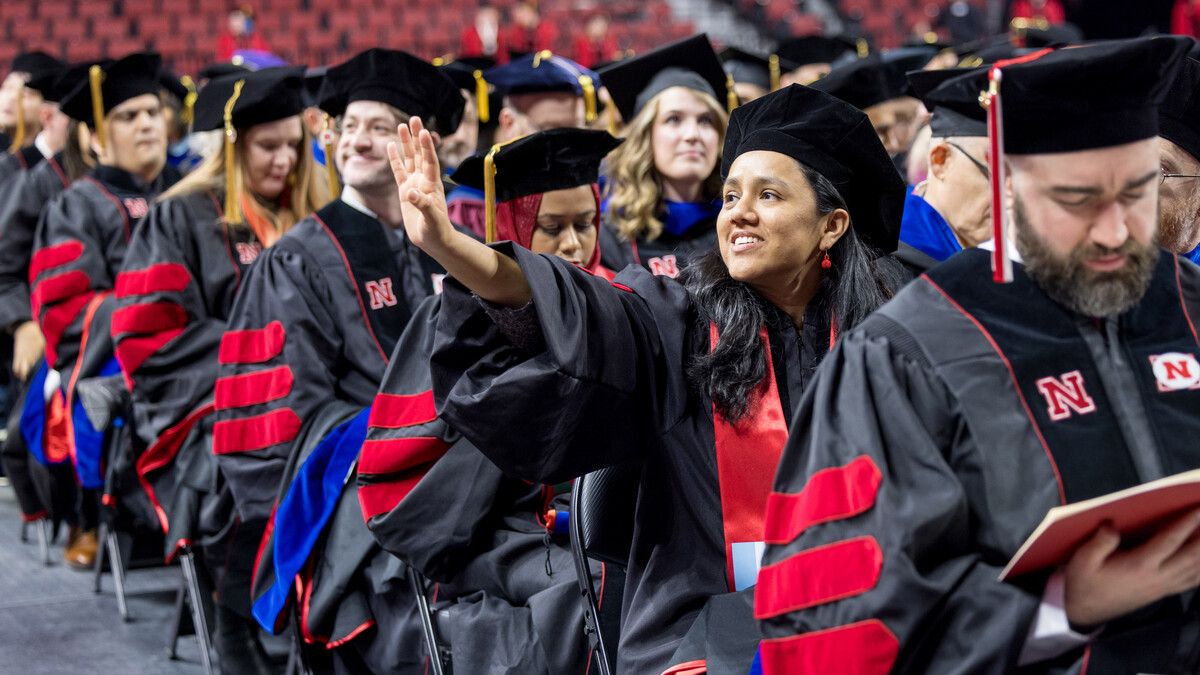
Editor’s Note — In observance of Women’s History Month, Nebraska Today is honoring Husker alumnae in March. Every Tuesday and Thursday, we’ll publish a feature story about Nebraska graduates making their mark on the world.
Nebraska’s Kristi Boswell is using degrees earned from the College of Agricultural Sciences and Natural Resources and the College of Law to help shape national policy in Washington, D.C. Boswell is currently serving as senior adviser to the secretary at the United States Department of Agriculture. She also was selected to be special adviser to the senior adviser in the Executive Office of the President. The Nebraska Alumni Center recently sat down with Boswell to discuss the role she plays with the USDA and the path taken to earn her dream job.
As a native of Shickley, how is and was your family involved in the agricultural community?
Agriculture has always been an important part of my life. Growing up, I lived on a farm where my family raised corn and soybeans. And, given the size of my community, we were therefore active in the local and state-level agricultural associations. As a student, I was active in agricultural education and Future Farmers of America, which provided me the opportunity to participate in competitive events and show livestock at the fair. Being a farm kid truly impacted who I am today, as it has instilled a hard work ethic, drive and passion. It has influenced everything I have done in my life and aids me in making positive, thoughtful impacts on the work I do every day.
With such a close connection to agriculture, how did that affect your educational journey and help keep a sense of connection to your roots?
Uniquely, even at an early age, I had the desire to pursue work in law and policy. Fortunately, at the age of 16, I was selected to attend a leadership conference in Washington, D.C., an opportunity that solidified my interest in living there and choosing a career where I could influence policy. Later, I attended the Nebraska Department of Agriculture’s Nebraska Agricultural Youth Institute, a conference I sincerely credit for assisting my future endeavors. The conference helped me realize that I could combine a career in law and policy with my passion for agriculture.
While attending the University of Nebraska–Lincoln, you studied agricultural economics. What opportunities did you have as an undergraduate student that helped you accomplish your goals?
My experience at Nebraska was fantastic, especially within the College of Agricultural Sciences and Natural Resources. As a student, the university community fostered the idea of personal development, which was further assisted by my professors, as they were eager to connect me with opportunities that would advance my career goals. In addition, I greatly appreciated the opportunity CASNR provided by offering a public policy option of an agricultural economics degree. The combined program allowed me to sharpen my policy development and interpretation skills along with taking the traditional applied economics courses. Due to the fact that political science and economic classes were within other departments on another campus, I was able to avail myself to other awesome opportunities to diversify my experience.
Upon graduation, I considered a variety of possible next steps. Ultimately, I accepted a position with the Nebraska legislature. It was the experiences I had through that position that helped me quickly realize a law degree was in my future. I knew that whether I chose to practice, work in government or influence policy, the value and skills obtained would lead me to a position that helped me solve problems about which I cared very deeply.
What experiences at Nebraska Law helped you ultimately land in a career that you have clearly been so passionate about for the majority of your life?
The coursework within agricultural law is what drew me to Nebraska Law. I was allowed to create a program of concentrated study in an area that really meant something to me. I had always imagined I would go straight into a policy role. Though, through clerkships with firms and the experiences I had while a student in the civil clinic, I decided my next move was to practice corporate defense litigation.
So, after law school, I spent a few years as a practicing attorney, knowing that while I was gaining a lot of knowledge, also realizing it was not D.C., which is where I had always where I wanted to land. Due to connections from my family’s involvement in local associations, my resume got sent to American Farm Bureau. Throughout the interview process with American Farm Bureau, it was clear my law degree and farm background set me apart from everyone else. Agricultural labor and immigration issues are at the forefront of what matters to farmers. So, the combination of my agricultural and economical skills, along with my legal work in employment law, allowed me to jump right in and concentrate on those issues. Again, I thank Nebraska Law for preparing me for the opportunity to litigate employment matters, while honing in on my agricultural coursework.
In today’s climate, what are the biggest challenges within your field?
I am honored to serve as a senior adviser to Secretary Sonny Perdue at the United States Department of Agriculture. The secretary’s motto is, “Do right and feed everyone.” My colleagues and I come to work every day, knowing our goal is to serve farmers, ranchers and rural America. I feel incredibly blessed to be a part of the secretary’s team and to be a voice for farmers, such as my parents.
In a political climate that is often divisive, it is very challenging to feel like the work we are doing is actually making a difference as quickly as we’d like to see. I handle the immigration and ag labor portfolio for the Secretary, which is one of the top three critical issues farmers report to the Secretary. This issue, as well as so many others, are so very important and our stakeholders want to see changes immediately. You quickly learn that broad sweeping legislative reforms are rare. Setting smaller goals helps continue the forward push to make incremental changes.
It’s obvious you’ve accomplished a lot and have landed a job you love in the place you have always wanted to live. Please share with our readers a moment of which you are most proud.
Though I have accomplished policy changes, I am most proud of the fact that I am here at all. Most would probably say that for a 12-year-old girl from a town of 300 people, that I was dreaming too big or that it was out of reach. Yes, there are many challenging days, but there are so many pinch me moments. I feel incredibly blessed when I walk into the White House, sit and laugh with the secretary of agriculture, walk through the halls of Congress, or even if I just go for run along the monuments. Through it all, I try very hard not to forget my roots because, frankly, it is just really cool to be part of the process.
As a woman in the field of law and in D.C., what is something you would like to impress upon younger women with big dreams such as yours when you were little?
Be bold and maximize every opportunity you get. Do not underestimate yourself. I was younger when I arrived in D.C. and walked into an issue that had a lot of history, emotion and politicization. As a result, people underestimated me. But, if you work hard, believe in your knowledge and show courage through your voice, you will shift people’s focus and understanding of your determination, reversing their mindset and earn their respect.







